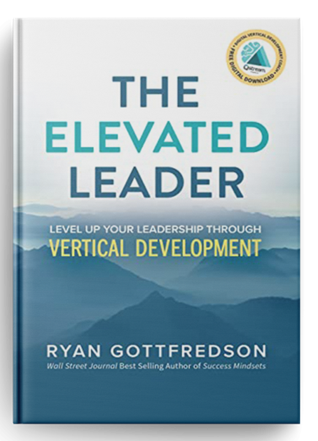Let’s be real, some people are more conscious, mindful, and present than others.
We can also say that some people are more stuck in their own world, narrow-minded, and struggle to connect with the present.
For me, one way to describe the differences between these people is that some people are more “awake” than others. And, let’s be realistic: people operate somewhere along the continuum from fully asleep to fully awake, and few are at the far continuums.
What is tricky, of course, is that I don’t think there is anyone who thinks of themselves as being “asleep,” even if they really are.
Quite frankly, a decent percentage of executives that I work with are people whom I would classify as being “asleep.”
In this article, I want to present six of the most common signs that I see of someone being asleep. This will hopefully be helpful for:
- Those of us who are more asleep to help us wake up
- Those of us who want to better get a sense if those around them (colleagues, family members) are asleep, which might precede any efforts to help them awaken
The Six Signs that You Might Be Asleep
1. You Say that You Don’t Have Fears
When I coach executives, I walk them through a vertical development exercise to help them identify their mental blocks and limiting mindsets. In the process of this exercise, we get to a place where I ask them, “What fear is going on here for you?”
For about 15% of executives, the response that I get is a defensive, “I don’t have any fears” or “I am not driven by fear.”
This always makes me chuckle on the inside, because I believe that everyone has fears, but that not everyone is aware of or in touch with their fears.
And, if someone really has done the work to overcome their fears and insecurities, they wouldn’t be so defensive about talking about their fears.
Thus, one sign that one might be asleep is that they are unwilling or unable to connect with their fears.
2. You Are Unwilling to Step into Discomfort
There are a lot of things that are or can be really good for us, but are uncomfortable. These include things like:
- Receiving feedback or constructive criticism
- Hearing a perspective that is different from your own or even having a disagreement with someone
- Experiencing problems or setback
- Experiencing failure
- Admitting that we have been wrong, or even exploring the possibility that we might be wrong
- Hiring a subordinate that may be more qualified than we are
Each of these things is uncomfortable in the moment, but may have huge benefits for us in the long run.
If we are someone who prioritizes the short-term comfort over long-term growth, that is a signal that we are more asleep than awake.
3. You are Prone to Redirect
Have you ever seen someone receive feedback on how they can improve and they fail to take ownership and do one of the following:
- Not explore what role they may have played in the issue
- Make excuses
- Say “ok” instead of “I’m sorry”
In fact, I saw this with my daughter as I subbed as her soccer coach in practice yesterday. We were doing a dribbling drill and I encouraged her to improve her kick at the end. She responded by saying, “but, I couldn’t because…” instead of saying, “Ok, I’ll try better next time.”
These are all examples of redirecting, and it is the third sign that someone might be more asleep than awake.
4. You Do Not Create Space for New and Different Ideas
Most executive teams that I work with operate at the Mind 2.0 – Progress Maker level. When we dive into why they are prone to operate at that level, it is not uncommon to discover that their compensation/incentive/promotion structures formally and informally incentivize outcome-orientation and competition as opposed to purpose-orientation and collaboration.
When I discover this phenomenon, I feel it is necessary to suggest that they rethink and reevaluate their compensation/incentive/promotion structures.
I have yet to have an instance where the executive team is interested in doing this. One of the primary reasons for this is because they are scared or worried about their compensation or bonus structure being negatively impacted, which is understandable, albeit limiting.
This is just one example of many that I have come across where new or different ideas are brought up, but are very quickly pushed down and dismissed.
If an idea is ever very quickly pushed down and dismissed, it is a signal that the person or people who are pushing it down and dismissing it are more asleep than awake.
5. You Ignore or Pass Over the Feelings of Others
There are times when my children have big emotions, and often, these instances feel very irrational. I am ashamed to admit it, but there have been times when I have ignored their big emotions and chalked the situation as them just being difficult.
But, there have been other times when I have seen my children’s big emotions as a signal that they are not feeling connected to me. Or, as I have tried to step into their feelings I have found that while their big emotions came about after a small slight, what was really going on was a bigger and deeper issue that may have come about because of a conflict that they had at school that day.
When we are unable to step into the emotions of others, feel like others are being too emotional, or make jokes at the expense of others to diffuse our own emotions, these are all signals that we are more asleep than awake.
6. You Make Judgments instead of Ask Questions
When someone shows up late for work, do you assume that they are a poor employee and reprimand them, or do you ask them why they were late and legitimately listen to them?
When you see a person standing on the street corner asking for assistance, are you quick to be critical of them, or do you want to ask them about what they have been through in life?
When someone cuts you off while driving, do you immediately get angry, or do you wonder what might be going on in their life that leads to them driving more aggressively?
Throughout life we encounter others who think or behave in a manner that rubs against our grain, if we are prone to make judgments and step away from that person as a oppose to ask questions and step toward that person, it is a sign that we are more asleep than awake.
Conclusion
If you are anything like me, you can see times in which you are more awake and more asleep. And, some people just operate more asleep versus awake, generally.
The truth is that all of us can become more awake, and the more awake we can become, the more we can be a positive influence within the spheres we operate in.
Let me leave you with some questions for introspection:
- To what degree are you actively seeking to become more awake?
- Are you actively seeking out and awakening to your fears?
- Are you actively putting yourself in situations of discomfort (i.e., stepping out of your comfort zone)?
- Are you willing to recognize your weaknesses and missteps (as opposed to redirecting)?
- Do you actively create space for different ideas and voices?
- Do you step toward others when they are experiencing hard emotions?
- Do you actively lean in with questions when things are going quite right?
If you want to become more actively engaged in doing these things, I think my books could help:












